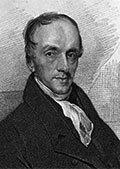the Last Week after Epiphany
Click here to learn more!
Bible Commentaries
Watson's Commentary on Matthew, Mark, Luke and Romans Watson's Commentary
New Testament
Jesus' life, teachings, and fulfillment of Old Testament prophecies as the Messiah. Mark
A fast-paced account of Jesus' ministry, focusing on his actions and sacrificial death. Luke
Jesus' life, emphasizing compassion for the marginalized and the universal scope of salvation. Romans
A theological treatise on salvation, grace, faith, and righteousness through Jesus Christ for all.
Author's Biography
Richard Watson was a pivotal figure in the Methodist movement, renowned for his theological contributions and as a staunch advocate for Methodism's spread and doctrinal clarity. Born on February 22, 1781, in Lincolnshire, England, Watson's early life was marked by a keen intellect and a profound spiritual awakening that directed him towards a life of ministry and theological inquiry.
Watson's journey with the Methodist church began in earnest when he was just a teenager, and by the age of 22, he was fully immersed in the life of preaching and pastoral care within the Methodist community. His theological insights and oratorical skills quickly made him a central figure in the Methodist movement. Despite facing health challenges, Watson's passion for his faith and his dedication to the church never waned.
In 1812, Watson's theological and organizational acumen led him to a significant role within the Methodist Conference, where he contributed to shaping the church's direction and doctrinal standards. He was instrumental in the foundation of the Methodist Missionary Society in 1813, highlighting his commitment to spreading the Methodist faith globally.
Watson's written works, including "Theological Institutes," which was among the first systematic theologies in the Methodist tradition, and his commentary on the New Testament, have left a lasting impact on Methodist theology and Christian scholarship. His writings not only provided a robust theological framework for Methodists but also engaged with broader theological debates of his time, showcasing his intellectual breadth and ecumenical spirit.
Throughout his life, Richard Watson was revered not just for his theological depth but also for his commitment to social justice issues, including the abolition of slavery, reflecting his belief in the application of Christian principles to societal reforms.
Richard Watson passed away on January 8, 1833, in London, but his legacy endures in the Methodist Church and beyond, as generations of theologians and believers continue to be inspired by his life and work. Watson's contributions to theology, his commitment to missionary work, and his influence on Methodist doctrine and practice have cemented his place as one of the most important figures in the history of Methodism.
